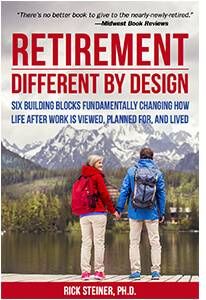How to Go From Type A to Type B in Retirement
Tips from the ex-workaholic author of 'Retirement: Different by Design'
(This article is adapted from Retirement: Different by Design.)
How you approach your retirement and behave in retirement is up to you.
Some of our “behaviors” that served us well at work might not serve us well in retirement. So we either have to discard or modify some of those nonconforming “behaviors” once retired or seek other options for “spilling-off” and channeling those behaviors in more positive ways — like a part-time job or volunteering.
Let’s rewind to the 1950s when two cardiologists (Meyer Friedman and Ray Rosenman) published a study of healthy men age 35 to 59 that focused on personality type as a potential risk factor in heart attacks. They divided the subjects into Type A personalities and Type B personalities. Type A’s were impatient, workaholic loners characterized by their intense drive, focus, ambition, competitiveness, anger, rigidity and a “my way or the highway” approach to life. Type B's were patient, encouraging social beings who enjoyed working with others and were slow to anger.
They doctors concluded that Type A's were two times more likely to suffer a heart attack than Type B's.
Your Choice: Type A or Type B?
So, will you be living a Type A or a Type B retirement? It’s your choice.
Because of who and what they are, Type A’s generally don’t do well in retirement. Type A’s need tasks and objectives and deadlines to keep themselves occupied. And Type A’s want to know precisely where they fit in and who they can manage or control, even though retirees have no organization chart.
Type A’s, if you let them, will do everything they can to organize “lazy retirees” into high-functioning groups with schedules and objectives, like getting up to run at 6 a.m. or playing golf every day at 9 a.m. and tennis at 3 p.m. and cocktails at 5 p.m. That kind of approach is off-putting to fellow retirees.

You can quickly see that this is not a formula for either a successful retirement or for making friends and having a robust social life.
In fact, in retirement, Type A’s are often ridiculed, ignored or shunned because of their heavy-handed, misguided and uncompromising approaches to making friends and influencing people.
Type B’s, by contrast, are the ultimate “good guys or gals” who other retirees seek out to socialize and play with.
Type B’s are more than willing volunteers to help those less fortunate and, in fact, seek those opportunities in retirement as a way of giving back for all they have been given. Regardless of who they were in their previous lives, Type B’s prefer to be addressed by their first name over Doctor or Professor or Judge or Mayor as they were once known.
It’s quite obvious that Type B personalities will typically do quite well in retirement.
How to Go From Type A to Type B
So what can Type A personalities do to make their retirements pleasant, satisfying and ultimately successful long-term experiences? Here are a few suggestions:
Keep your hostility and anger in check. Put yourself in the place of the person you are directing your anger at. Let real or apparent misdeeds, missteps or totally wrong-headed comments slide off. You don’t have to respond to every slight, factual inaccuracy, or perceived insult. Let it go!
Confide in your significant other about your concerns, fears and problems arising from retirement. Establish activities you can enjoy together and reserve time for attending events together as well as just for talking, planning and dreaming.
Don’t live life by the clock. Retirement gives you an opportunity to disrupt old patterns and release yourself from the “tyranny of time.” Don’t overschedule your day; let the day evolve. It’s OK to take a nap or go for a bike ride or a walk and do that chore you thought you would get to today tomorrow. Give freedom a chance.
Recognize when tension and stress are building and cut ’em off at the pass. Don’t let tension build like a pressure cooker that whistles away until you hear and feel that explosion of anger followed by regret for losing control.
Become a good follower. Join, groups, clubs and organizations and let others take the lead. Then, support the team even if you believe you can do a better job of leading.
Learn to relax by taking up hobbies for their own sake (not to impress others). Find an enjoyable diversion or non-competitive sport that will not turn into a fierce competition. Seek fun things to do that are stress reducing and won’t become stress inducing. Or how about rekindling that youthful desire to play the guitar in a rock band? Open yourself to any activity that tickles your fancy.
Volunteer to help others. And be thankful for what you have.
Keep moving. Physical activity is probably the healthiest, least expensive preventative treatment for stress.
Prepare your own list of behavioral reminders and “mantras” that will take you from bitterness and anger to joy and relaxation; from boredom to action and from solitude to embracing others on equal terms. You will never regret it.

